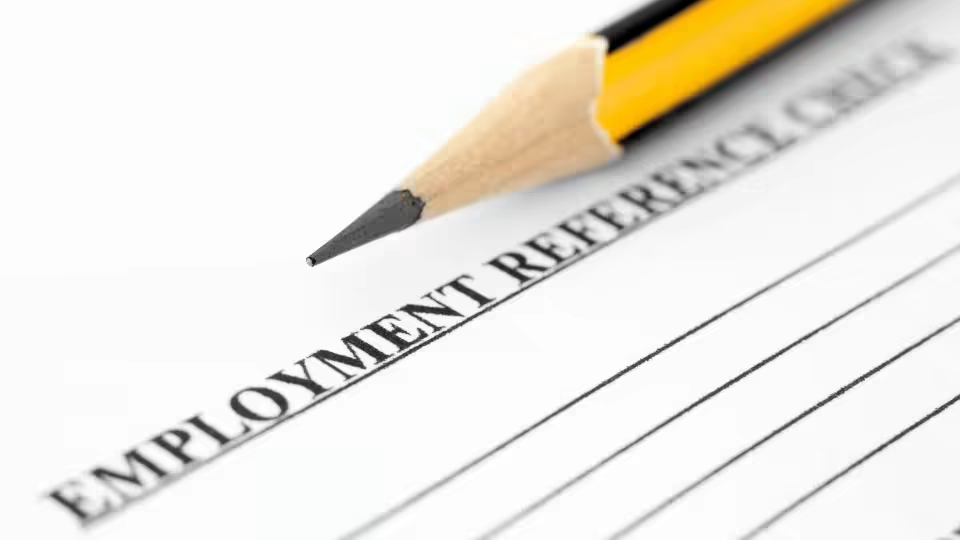What is reference check on employees?
A reference check on employees is when a prospective employer contacts individuals who can attest to your qualifications, working history, education, and references. When you submit a job application, the employer can ask you to list a few references who can attest to your identity and that you are qualified for the position. Before requesting a reference check, human resource (HR) experts or recruiting managers often get the candidate's consent. Typically, they call or email references to verify prior employment and learn more about the applicant's knowledge, skills, abilities, and character.
Reference checks typically entail contacting the applicant's past employers, supervisors, co-workers, and educators. As part of the employment process, the majority of employers examine references. To verify important job and educational information and learn more about a candidate's past, experiences, and talents, reference checking on employees entails getting in touch with the candidate's former employers, supervisors, schools, and other relevant parties.
As part of the hiring process, many businesses examine references. A reference check is when a potential employer gets in touch with a job applicant's previous employers, institutions of higher learning, and other sources to learn more about their employment history, academic credentials, and additional relevant information.
Your gut instinct or intuition can support your checks, but they are insufficient. Reference checks might highlight any weaknesses in a candidate's defence. Nearly two-thirds of employers (66 percent), according to the Monster Special Report - the Future of Work 2021 Global Outlook, believe that applicants inflate their experience level on their resumes. Candidates frequently create cover letters to accompany their applications, and these letters are infamous for embellishment and exaggeration.
A reference check is a recruiting technique that entails vetting the information provided by a potential employee by getting in touch with the candidate's former employers. Recruiters frequently use it as a crucial step in the hiring process.
Benefits of checking references
- Employer learns the veracity of the information the potential employee provides through verification.
- Employers are made aware if there is any criminal or unlawful conduct going on.
- By looking at previous employment records, the employer can predict the future of the employees in the organization.
- Employers learn about the career trajectory of their employees.
Why Are Reference Checks On Employees Needed?
You can verify the information on the applicant's application and resumes using these checks. Someone who has seen the candidate perform will also provide you with more insight into their knowledge, skills, and abilities.
It is crucial that you get the applicant's permission before contacting references or asking about employment during the interview process. Managers frequently make the error of allowing candidates to select their references. It is recommended to contact two or three references who have worked with you. Tell the candidates that you would like to meet with those who oversaw them instead. Go to the candidates' former employers if their current employers are unaware that they are looking for work elsewhere.
A thorough reference check:
- Enables you to obtain independent information about your candidate's previous on-the-job performance,
- Directly related to the key selection criteria of the role on offer; provides an opportunity to address any gaps or lingering questions based on the applicant's resume or from their interview, such as the potential reasons they left a previous position;
- And can reveal anything in a candidate's past, including theft and criminal convictions.
Managing Reference Checks On Employees
- Make sure the referees are real. You can feel at ease using any of these methods.
- Call the HR department to ensure the referee you will be calling works for the company. It's not uncommon for the names of purportedly former "managers" to turn out to be co-workers or pals.
- Verify the information they provided to you on LinkedIn.
- After speaking with them, connect with them on LinkedIn and express your gratitude for their time. This will demonstrate that the referee you spoke with was real.
- Ask the referee to send you the details via business email.
- Call them on the landline instead of their cell
- Be ready by preparing a few essential questions, but avoid making this an exercise in box-ticking. Be sure to pay close attention and have some follow-up inquiries prepared. Where required, dig deeper.
- Establish a suitable time to call the referee. Give them the courtesy of asking them first and letting them know in advance how long the talk will last.
What A Reference Check On Employees Should Contain
Multiple steps may be included in a reference check on employees. The employer must confirm the employee's employment history, job titles, college attendance dates, and degree earned. As part of an extensive reference check, speaking with references will provide information about an applicant's talents, credentials, and capabilities for the position.
- A candidate's prior employment experience, educational background, and credentials, as well as their qualities and accomplishments.
- What concerns affected their ability to accomplish their job, whether they are a team player or an independent worker,
- How well they got along with management and their co-workers, what challenges they should expect, and what they need to improve,
Justifications for Reference Checks on Employees
Reference checks on employees are performed by employers for a variety of reasons, with the primary objective being to find the right candidate for the position.
SAFETY: Avoiding harm or legal liability to the employer or third parties is a crucial reason to undertake background and reference checks. This covers injury caused to:
- Other workers as a result of sexual harassment or workplace violence. Customers of the business may be victimized, for instance, through a sexual assault on company property.
- The general public through careless driving. The employer's business could suffer a financial loss or problems with its reputation.
- · Deep criminal background checks on job applicants are necessary to defend against legal accusations like negligent hiring.
MAXIMIZE PRODUCTIVITY: There's a quote that says, "Hire the best and reject the rest." Past performance is a reliable predictor of future performance and can provide information about a person's professionalism, productivity, job skills, and interpersonal communication prowess. A reference check assists in separating the real high flyers from the posers.
Why You Need The Insight On Reference Checks On Employees
The insights obtained from reference checks on employees will give the manager of the "new" employee useful information to prepare them for their recruitment better and ensure that you are employing the correct individual for the position. They will also assist you in determining whether you are pairing up the right manager with a leadership style that will benefit both parties.
Think twice before responding negatively. The most crucial factor to consider is whether they suit your company's culture. They might not be pertinent to the position; even the best workers can always do better in one or two specific areas. Considering the latter, consider the following advice for optimizing your reference check procedure.
Ask the interview team for advice:
- Even though the interview team may have already made the hiring decision, there is still additional insight to be gained from the process.
- Do interviewers have any reservations about the candidate?
- Are there any details you would have liked to learn more about or pursue further?
- In this regard, the interview team's feedback needs to inform how you should conduct the reference check procedure.
Ask detailed questions about the position's duties and provide a description of the position:
- Use a phrase like " You must be able to do x, y, and z to be successful in this position.
- Then ask the reference to elaborate on how they believe the applicant meets those requirements.
Pose open-ended but precise questions:
- Tell me about [candidate] queries are pointless unless you want a generic response like, "They're amazing!" Instead, request specific examples from their references or more information on a project you are already familiar with.
- For instance, "We discovered [candidate] assisted in creating your new website; could you please elaborate on their contribution to that project?"
Reference Check on Employees: Questions to ask
As said previously, we advise you to modify each reference check on employees in accordance with your organization's requirements or concerns for a certain candidate. In light of this, having a template for all potential hiring is helpful for organizations. The following list of typical reference check inquiries can be used in your template:
- Can you confirm the job applicant's employment status, position title, compensation, and duties? Why did they quit that position?
- How do you know the applicant for the job?
- What qualifies the applicant as a suitable fit for the position?
- Would you rehire this job applicant if you had the chance? Why?
- What are the candidate's main advantages and disadvantages? Did the applicant get along well with the management and other employees?
- How did (name) manage a disagreement? How about force? Stress?
- What suggestions do you have for how I should handle the job candidate?
- What do I still need to know about the job applicant I have not previously gotten?
- Who else should I ask about the candidate who might provide more insight?
How to simplify the process of reference checking on employees
Use the following advice to make reference checking simpler for both you and the job applicant:
1. Identify your reference procedures
Make sure your candidates know your reference-checking procedures so they can get ready. Let candidates know you'll verify references because unpleasant surprises can make them less likely to trust your business and you as the recruiting manager or human resources specialist. It will also help to guarantee that the applicant is truthful during the application process if you let them know to anticipate a reference check and, ideally, when.
2. Compile a list of inquiries.
If you have a list of questions you can ask or modify for each reference, you'll be better prepared to discuss a prospect's qualifications. The questions you ask may change depending on your hiring role and what your applicant mentioned during the interview.
3. Conduct your reference checks.
If you're the recruiting manager, you must check references on your own rather than having a co-worker or member of HR do it. The most significant person to ask the correct questions to learn more about a candidate is you, so you should know what the role requires and what you're looking for in a new hire.
4. Watch out for warning signs
You, as the hiring manager, could spot several warning signs during the reference check procedure. Even if some of these may turn out to be unimportant, it's crucial to identify potential issues so you may discuss any worries you may have with the candidate. Here are some typical warning signs:
- Inconsistent information
- Negative encounters
- Inaccurate contact details
Reference checks on employees might assist you in learning more about the applicant. It's only one component of a successful recruitment strategy, though. By incorporating reference checks into your hiring procedure, you'll be able to verify the qualifications of your candidates, get answers to any queries you may have about their work history, and, ideally, gain the confidence you need to hire them without any second thoughts.



